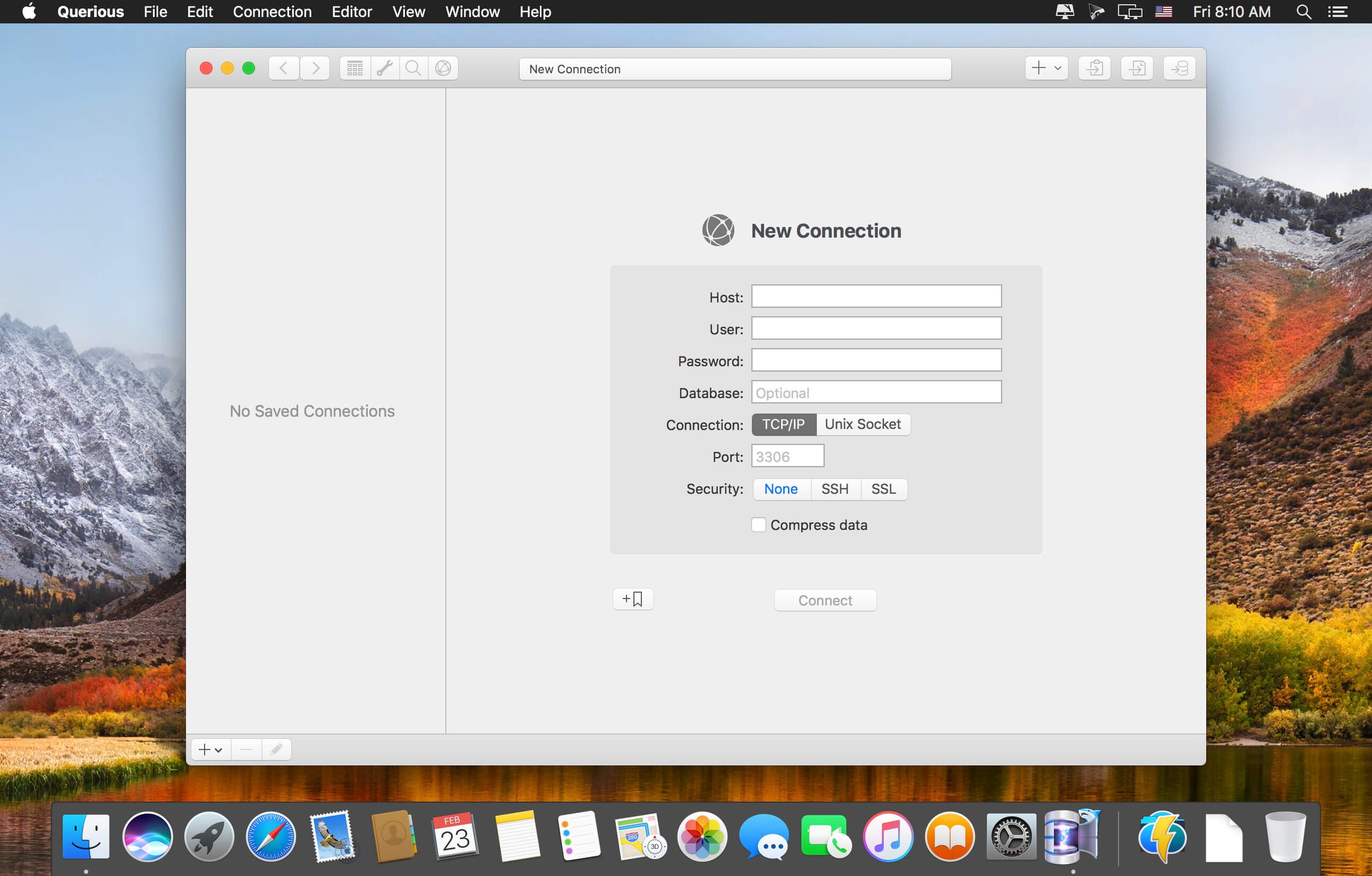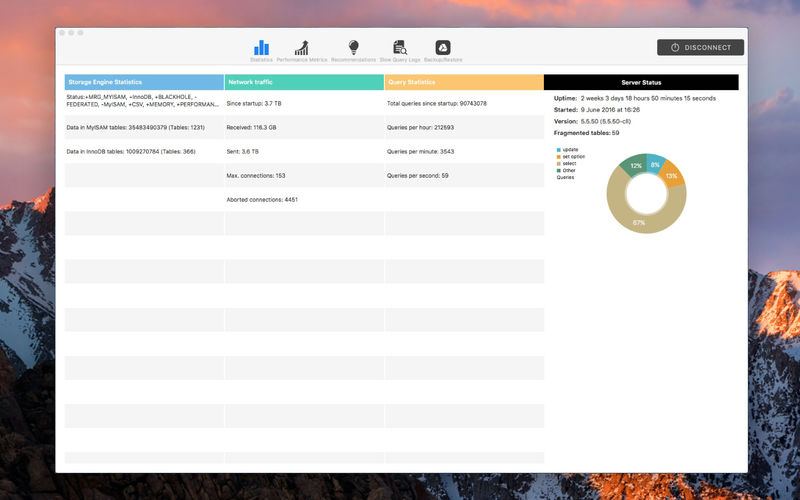
Reference information for Aurora MySQL. Aurora MySQL Parameters. You manage your Amazon Aurora MySQL DB cluster in the same way that you manage other Amazon RDS DB instances, by using parameters in a DB parameter group.
MySQL Optimizer 1.9.1
MySQL / MariaDB Optimizer is an effective app that gives you recommendations to optimize MySQL / MariaDB databases. The app provides a graphical interface simplify the process of viewing performance metrics, apply changes based on our recommendations and all mysql slow query logs which are grouped by occurrence number.
Main Features:
- Performance Metrics (very useful info about your server and mysql)
- Slow Query that are already grouped so you can fix slow queries that have highest occurrence first.
- Option to Explain slow queries
- Error logs are available within Slow query main screen
- Recommendations tab is the app main function, where you see a list of issues and recommendations, where applicable you can set the value and just tick to apply new values.
- Mysql Advanced Variables Editor, so you can adjust MySQL even further
Things to consider when applying recommendations:
- When you apply changes MySQL service restarts so your web sites will be offline for couple seconds
- Make sure you understand the changes you make as in some cases they might not be suitable
- You can always revert changes by going to Backup/restore tab and select the version you want to revert to
- Once you apply some changes MySQL needs time to collect data again for new statistics and recommendations and while it's recommended to wait 24hours before applying more changes, the app will allow you to do it after 6hours
- using Standard MySQL connections you will not be able to make any changes (apply recommendations or edit variables) - that is only possible when using SSH Connection
Linux distributions supported (to add SSH servers):
- Ubuntu 14.04 (LTS), 14.10, 15.04, 15.10, 16.04, 16.10, 17.04
- CentOS 6.x, 7.x
- Amazon Linux 2016.03, 2016.09
- Red Hat Enterprise Linux 6.x, 7.x
- Debian 7, 8, 9
What's New:
Version 1.9.1:
- Fixed an app crash when using non-root mysql users
Screenshots:
- Title: MySQL Optimizer 1.9.1
- Developer: Global Web SRL
- Compatibility: macOS 10.11 or later 64-bit
- Language: English
- Includes: K'ed by TNT
- Size: 11.58 MB
- visit official website
NitroFlare:
23.6.2 Partitioning Limitations Relating to Storage Engines
In MySQL 8.0, partitioning support is not actually provided by the MySQL Server, but rather by a table storage engine's own or native partitioning handler. In MySQL 8.0, only the InnoDB storage engine provides a native partitioning handler. This means that partitioned tables cannot be created using any other storage engine.
Mysql Optimizer 1.9.1 Free
MySQL Cluster's NDB storage engine also provides native partitioning support, but is not currently supported in MySQL 8.0.
ALTER TABLE ... OPTIMIZE PARTITION does not work correctly with partitioned tables that use InnoDB. Use ALTER TABLE ... REBUILD PARTITION and ALTER TABLE ... ANALYZE PARTITION, instead, for such tables. For more information, see Section 13.1.9.1, “ALTER TABLE Partition Operations”.
User-defined partitioning and the NDB storage engine (NDB Cluster). Partitioning by KEY (including LINEAR KEY) is the only type of partitioning supported for the NDB storage engine. It is not possible under normal circumstances in NDB Cluster to create an NDB Cluster table using any partitioning type other than [LINEAR] KEY, and attempting to do so fails with an error.
Exception (not for production): It is possible to override this restriction by setting the new system variable on NDB Cluster SQL nodes to ON. If you choose to do this, you should be aware that tables using partitioning types other than [LINEAR] KEY are not supported in production. In such cases, you can create and use tables with partitioning types other than KEY or LINEAR KEY, but you do this entirely at your own risk.
The maximum number of partitions that can be defined for an NDB table depends on the number of data nodes and node groups in the cluster, the version of the NDB Cluster software in use, and other factors. See NDB and user-defined partitioning, for more information.
The maximum amount of fixed-size data that can be stored per partition in an NDB table is 128 TB. Previously, this was 16 GB.
Select 1 Mysql
CREATE TABLE and ALTER TABLE statements that would cause a user-partitioned NDB table not to meet either or both of the following two requirements are not permitted, and fail with an error:
Mysql 5.1 Download
The table must have an explicit primary key.
All columns listed in the table's partitioning expression must be part of the primary key.
Exception. If a user-partitioned NDB table is created using an empty column-list (that is, using PARTITION BY KEY() or PARTITION BY LINEAR KEY()), then no explicit primary key is required.
Mysql Optimizer 1.9.1 Windows 10
Upgrading partitioned tables. When performing an upgrade, tables which are partitioned by KEY must be dumped and reloaded. Partitioned tables using storage engines other than InnoDB cannot be upgraded from MySQL 5.7 or earlier to MySQL 8.0 or later; you must either drop the partitioning from such tables with ALTER TABLE ... REMOVE PARTITIONING or convert them to InnoDB using ALTER TABLE ... ENGINE=INNODB prior to the upgrade.
For information about converting MyISAM tables to InnoDB, see Section 15.6.1.5, “Converting Tables from MyISAM to InnoDB”.